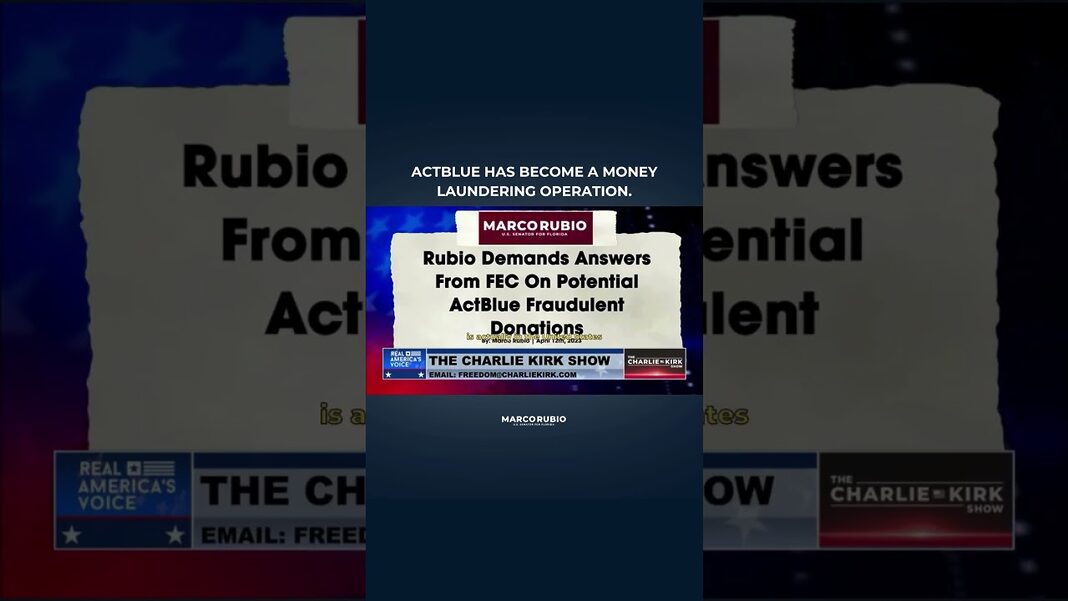A number of high profile people in politics and news journalism have seemingly exposed the Democrat’s political fund raising organization ActBlue as engaging in a money laundering scheme. The allegation holds that they are taking millions of dollars in dark money donations (donated money of unknown origin) and then making small amount donations in the names of a variety of registered Democrat voters without their knowledge.
The scam seemingly kicked into high gear most recently when vice president Kamala Harris became the presumptive nominee for president after Joe Biden withdrew from the 2024 race. The Harris campaign proudly announced they had raised $200 million since she emerged as the likely Democratic presidential nominee in one week and $310 million for the month of July.
Senator Marco Rubio (FL – R) was one of the first political figures to call out the organization for the illegal activity.
Virginia Attorney General Jason Miyares (R) is giving the Democrat fundraising platform ActBlue 10 days to provide information how it verifies the “legitimacy and accuracy” of donor information. Miyares has raised concerns about how “hundreds of thousands of dollars” of donations he believes are “in volumes that are facially implausible and appear suspicious.” Part of the impetus of this investigation appears to have been triggered by registered Democrat voters all across the country having donations made in their name they never made and could thus trigger a future IRS audit since the donations made are beyond their incomes.
For example, news journalist James O’Keefe visited a Maryland senior citizen who ActBlue shows donated over 1,000 times to the tune of over $200,000.
Maryland Woman Denies 1,000+ Donations to ActBlue; OMG Uncovers Fraud Scheme
— James O'Keefe (@JamesOKeefeIII) July 28, 2024
Cindy Nowe of Annapolis, Maryland, allegedly contributed over 1,000 times to ActBlue in 2022, totaling $18,849.77. That means Cindy would have had to donate three times a day, every day, for the whole… pic.twitter.com/XcHLyepV89
Virginia Attorney General Miyares’ investigation of ActBlue came days after Senator Marco Rubio flagged concerns about the organization to conservative pundit and Turning Point Action founder Charlie Kirk. While on Kirk’s podcast, Rubio said ActBlue “has become a money laundering operation.” The senator said that ActBlue doesn’t require a CVV code for a person to donate to the PAC.
“It’s a deliberate strategy on their part,” Rubio said. “If they had to use that code from their credit card, their donations would go.”
ActBlue responded to Miyares letter in a statement Friday.
“This investigation is nothing more than a partisan political attack and scare tactic to undermine the power of Democratic and progressive small-dollar donors. We welcome the opportunity to respond to these frivolous claims.
The promoters of this disinformation campaign have shown up at the homes of donors and harassed our staff in-person. This must stop. The continued escalation of these lies and their intimidating tactics is dangerous.
Republicans simply cannot accept that millions of Democrats are energized and engaged in the political process, and are instead resorting to political attacks and spreading false accusations.”
Miyares raised concerns in his letter about donors making “multiple daily contributions over the course of multiple years amounting to tens of thousands of dollars in aggregate.”
He noted, “Furthermore, some of these individuals are senior citizens, list their occupation as ‘not employed’ or ‘retired,’ and/or list suspicious addresses.”
Virginia AG Miyares questions whether donations are being made from “fictional donors or dummy accounts,” that “information reported by or through ActBlue may be fraudulent” or donations have been made “without the reported donors’ consent or awareness.”
Miyares requested ActBlue provide his office with “a detailed description of ActBlue’s processes and procedures for verifying the legitimacy and accuracy of donor and contribution information as well as the processes and procedures used in verifying information reported to regulatory bodies.”
The information is to be provided by August 12.
CONCLUSION:
Some are saying the way the Federal Election Commission (FEC) has campaigns report data to them might be at fault as the system sometimes shows donations in duplicate which means ActBlue may have done nothing wrong. But what James O’Keefe found in a recent undercover investigation of his O’Keefe Media Group (OMG) news report was much more than two or three times.
Podcaster journalist Charlie Kirk recently interviewed fellow podcaster and journalist James O’Keefe on his undercover investigation of ActBlue.
“James O’Keefe Went Undercover at ActBlue Conference: He Exposes the Illegal Activity He Uncovered”
O’Keefe has seemingly, once again, stumbled upon a story whereby the FBI and DOJ should be investigating with collaboration from both the FEC and IRS. What ActBlue appears to be engaged in is fraud!
“The ActBlue money laundering straw donor scandal – How it works -Why it matters – What you can do” – We The Governed
The terms hard and soft money can have different meanings depending on where they are used. In economics, hard money is closely tied to the value of gold or silver, in contrast to paper money that is not backed with a precious commodity such as gold, silver or oil. In politics, hard money refers to contributions to a specific candidate, compared to soft money contributions to a broader committee or party. This is a whole other issue with the ActBlue donations and how they are recorded (or not) for use.
This entire matter gets very confusing but not as confusing as it is to those people who find out they donated to ActBlue when they know they never did.
Copyright © 2024 by Mark S. Schwendau







